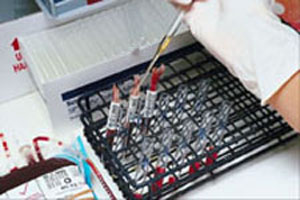
 Stem cells offer enormous potential for medical breakthroughs, but also enormous controversies for observant Catholics.
Stem cells offer enormous potential for medical breakthroughs, but also enormous controversies for observant Catholics.
Debate has raged in recent years over the ethics of using embryonic stem cells, one of the most common practices. Church teaching, however, forbids the use of those cells because it involves destroying a human life.
Adult stem cells, however, are acceptable to use for research, and those include cells available from another source whose benefits are still being studied — umbilical cord blood.
Cord blood stem cells are taken from the umbilical cord after a baby is safely delivered. The cells grow rapidly and have the potential to produce a wide variety of cell types, according to a statement from Cardinal William Keeler in July 2005.
Research into the use of adult stem cells, including cord blood, has also been endorsed by the Vatican, which donated $2.7 million to the cause in 2010.
Stem cells hold great hope for many physicians, especially neurosurgeons like Dr. Brian Cuddy, chief of staff at Bon Secours-St. Francis Xavier Hospital in Charleston.
Cuddy said the cells could offer regenerative treatment for people suffering from spinal cord injuries and Parkinson’s disease.
“As a Catholic physician, you want to pursue everything you can for your patient, but also understand there are certain doctrines and restrictions about how we can go about doing that,” he said. “Cord blood would potentially be an acceptable way for people to help their loved ones and themselves that falls within the ethic boundaries of the Catholic church. Studies on cord blood are very much in the preliminary phase, but I think they potentially could do a lot of good.”
Monica Wiser, a member of St. Peter Church in Beaufort, has been exploring cord blood donation for more than six months and wants to donate stem cells for use in research and possible therapies after her second child is born in August.
Wiser, an audiologist on Lady’s Island, said the process has been long and challenging because cord blood donation for research and treatment is still relatively uncommon and doesn’t receive much attention in the media.
More information, she said, is available for women who want to collect and bank cord blood for possible personal use in the future.
“I’ve been following stem cell research for many years, hoping that adult stem cells would ultimately prove to be the best option,” Wiser said.
She said her faith, and the story of a relative with cancer who benefited from treatment using his own adult stem cells, motivated her to learn about cord blood donation.
To her dismay and surprise, Wiser said she has run into opposition and skepticism from some in the medical profession.
Wiser finally contacted Duke University, which runs the Carolinas Cord Blood Bank, and received a collection kit so she can donate her cord blood cells in August. There is no charge for the collection kit, she said.
For more information, call Duke University at (919) 668-1116 or visit www.cancer.duke.edu/ccbb. Information about cord blood research is available at www.stemcell researchfacts.org.
